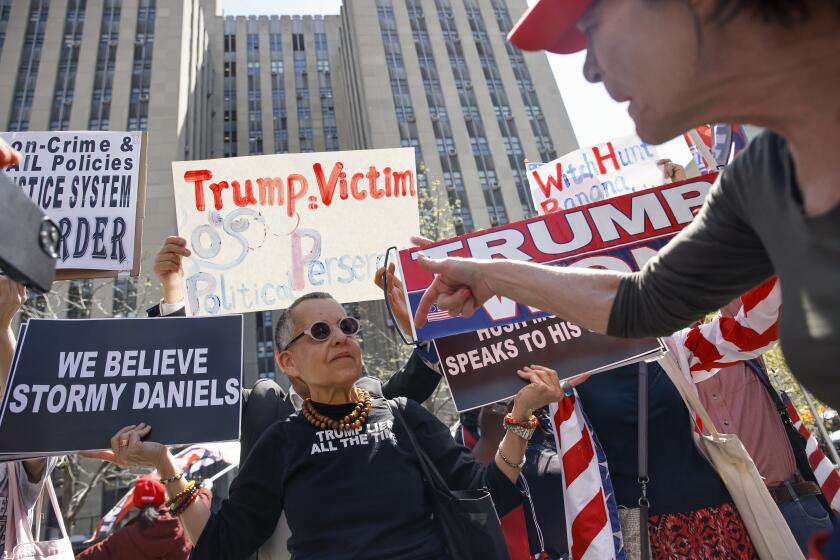The times I didn’t get married
‘Are you going to get married again?” my friend Jill asked, only hours after the California Supreme Court’s May 15 ruling on same-sex marriage. The interesting word in that sentence was “again.” Because as Jill well knows -- she introduced us 11 years ago -- my girlfriend Amy and I are not, in point of fact, legally married.
That’s not entirely for lack of trying. Although we were never the sort to chase ceremonies in what ever locale would allow them -- Vermont in 2000! Belgium ‘03! Canada ‘05! -- we did in 2004 plan to be among the 4,037 gay and lesbian couples who were wed in San Francisco in blatant defiance of state law.
It was my fault we didn’t jump right in the car when the news broke: I didn’t think we’d make it to the front of the line before some court shut down the weddings. But when a local judge let Mayor Gavin Newsom’s big Valentine’s Day party continue, and the county clerk starting taking appointments, we made plans.
Amy got the earliest appointment we could, for Monday, March 15. We bought rings. Our mothers reserved plane tickets and hotel rooms. The Friday before, we were packed, minutes from pulling out of the driveway, when my cellphone rang. For better reception, I stepped out onto the kitchen deck, where the wisteria vine that had been climbing upward for seven years was blooming for the first time. It was my co-worker Kevin who broke the news. “The Supreme Court shut down the weddings in San Francisco,” he said. “I’m sorry.”
My mother was boarding a plane; Amy’s too. Our witnesses were on the way from San Diego. So we all went to San Francisco for a long weekend to see Amy and me not get married. And despite everyone’s best efforts to resist moping and tears, there were plenty of both.
It’s hard, even now, to describe how unexpectedly brutal that disappointment was. Marriage was an institution to which we’d long been denied entry, a tool used to deem our entire relationship illegitimate. And we’d missed the chance, however brief, to join an army of gay couples and claim marriage as our own tool of civil disobedience.
The second time Amy and I didn’t get married was in July of that year. California had passed a beefed-up domestic partnership law, so we printed the forms off the Internet, had them notarized by a very puzzled septuagenarian at an insurance office on Sunset Boulevard and popped them in the mail. In return, we got more rights and protections, and a certificate the secretary of State’s office called “suitable for framing.” Amy’s 14-year-old cousin happily declared us “domesticated.”
The third time we didn’t get married was the next April at the Figueroa Hotel in downtown L.A. There were ornate invitations, 65 guests, a band, dinner and fancy outfits. There was no acknowledgment of this union by the state, but there were cocktails on the patio and manifestoes read aloud, the first of which came from Amy.
“There is no dignity in having your heart broken by faceless bureaucratic bigots fighting to preserve their crabbed and medieval worldview, nor in having one’s existence made subject to ballot propositions, nor in being used as a fundraising expedient by professional haters and hypocrites,” was part of what she told our assembled family and friends. “If the state isn’t ready, I’m not coming hat in hand begging for recognition or acceptance from the downpresser man or his minions.”
So here we are, 10 days out from the In re Marriage Cases ruling, Jill’s question still hanging in the air and another shoe about to drop: an initiative likely to qualify for the November ballot asking Californians again to impose the bureaucracy of paper and ink and filing cabinets to dictate how we can love each other.
So what do we do? Grab a license (assuming this court won’t stay its ruling) and then wait to see if our fellow citizens stomp on our hope again? Or wait it out, just to evade that potentially soul-crushing letter from the county registrar voiding the marriage?
It may seem surprising that we’d hesitate at all. But would you want your marriage put to a statewide popular vote?
You can’t be a gay person in America, even in California, and be a complete stranger to discrimination. But this is different. This is the state -- my state, my government -- throwing open one arm to us, yet holding the other poised to slap us hard.
Given past performances of initiatives to ban same-sex marriage in other states, it’s hard not to brace ourselves for the blow. Twenty-six states have amended their constitutions to explicitly bar same-sex couples from marrying. Just eight years ago in California, 61% of voters approved Proposition 22, the law the high court just struck down. It’s coming back around with the exact same wording -- “Only a marriage between a man and a woman is valid or recognized in California” -- but this time as a proposed amendment to the state Constitution, which could push the issue out of the state Supreme Court’s reach. In statewide polls in 2006 and 2007, 49% to 51% of respondents said they oppose making same-sex marriage legal.
So when and if Amy and I present ourselves at the county clerk’s office during this summer of love in California, the event will not be solely -- or even primarily -- an expression of our commitment to each another. We’ve expressed that over and over. It will be to unite ourselves with other gays, and all those who have supported our pursuit of full citizenship. And it will be an expression of faith in our fellow Californians, that come November they won’t break our hearts again.
Robin Rauzi is an articles editor for The Times’ Op-Ed page.
More to Read
A cure for the common opinion
Get thought-provoking perspectives with our weekly newsletter.
You may occasionally receive promotional content from the Los Angeles Times.






